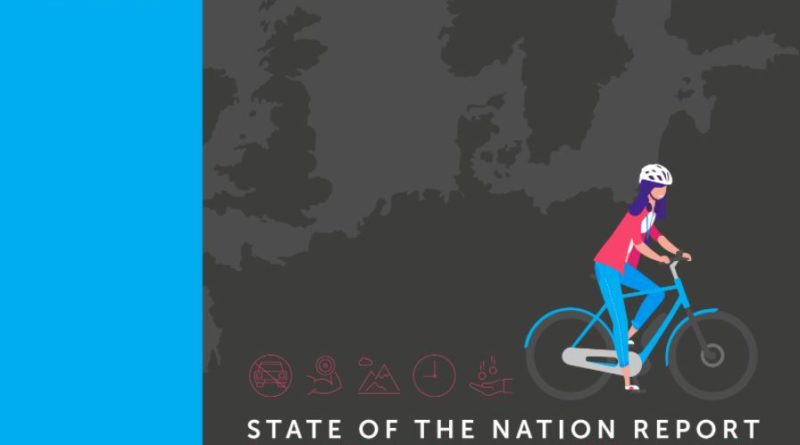Cost a hurdle, but electric bikes increasingly seen as car alternative
Shimano’s third State of the Nation report today reveals that 46% of Europeans now view electric bikes as a viable alternative to car journeys, yet cost remains a key barrier to adoption.
Backing up studies on the issue of a changing modal share where an electric bike has been found to be a catalyst for change in transport habits, the 14,000 people strong assessment of European opinion has 54% seeing cost of entry as a barrier to making the jump.
Arguably more pertinent than the financial burden, safety concerns resonate with 24% of the 66% of Europeans who are still on the fence about whether they will own or use an electric bike regularly in future.
Roman Meliška, a business consultant focused on active urban mobility, says in the report “Some cities were rocket fast in reallocating public space for people walking and on their bicycles, making cycling both more convenient and inviting for an all-new cohort of folk to independently move around the city.
“Not feeling safe on the current cycling infrastructure ranks among the very top reasons across all 12 countries as to why not to ride around the city on an e-bike. What Paris and others are doing is a masterclass worth following.”
Shimano hoped to make like-for-like comparisons, but hindered by Covid-19 instead sought to understand whether attitudes have shifted faster as a result of some of the measures put in place across Europe to stimulate bicycle use. 27% of Europeans have said they are more likely to use or buy an e-bike now than they were before the COVID-19 Pandemic, with two fifths (39%) saying they would use one to avoid public transport.
The motivations vary generation to generation, but over a third (37%) of those under 24 have said they would use an e-bike to lessen their impact on the environment, whereas two fifths (41%) of those over the age of 55 said they were looking for an alternative to a motor vehicle. 29% cited health benefits as a factor for putting an electric bike to use as part of their routine.
Researcher and active transport journalist Laura Laker commented: “E-bikes are powerful car trip replacements for those with access to one, cutting carbon emissions and air pollution for a fraction of the cost of electric cars, yet in many countries like the UK, where e-cycle uptake is very low indeed, e-cycles are the only electric vehicle that doesn’t yet have a purchase subsidy to encourage greater use.”
It is electric bikes for the city that are most drawing the consumer with 25% stating this segment draws them most, versus 14% for trekking and 12% for electric mountain bikes. Just 5% held an interest in a pedal assisted road bike and 6% a folding e-bike. 31% said they intended to use a city style electric bike in the next 12 months, whether owned or hired.
Women were most drawn to city-suited electric bikes (8% more than in the case of men), while men preferred the electric mountain bike (9% ahead of women’s demand).
Electric cargo – are consumers noticing?
Shimano’s data suggests they could be, even in the UK 5% studied would consider an electric cargo bike. Over in Germany, where the industry has found greater levels of reception, that figure is 7%, while in the neighbouring Netherlands its 8%. The industry projects a growth rate of as high as 65% this year, according to the City Changer Cargo Bike Project.
As far as age group, interest in their use is being driven by the youth (18-24 and 25-34 year olds responded most warmly) but these demographics will arguably be those who find the cost most prohibitive and thus be unlikely to trade in the car without incentives.
Bike shops are expected to be visited in the next 12 months by around 26% of those surveyed, while 22% would not. 30% did not yet own a bike. In the UK 11% are anticipating visiting a bike shop in the next year.
Likewise, in the UK just 11% expressed they were ‘more likely’ to buy electric bikes now than before the pandemic. Poland and Italy held the lead in Europe at 35% and 36% more likely to buy, respectively. These were trailed by The Netherlands at 33%, France and Spain at 31% and Austria at 30%.
Narrowing down the data on cost of entry concerns, it is the French and Dutch most bothered by the price and Denmark the least concerned.
Shimano’s Head of PR and Communications, Ben Hillsdon, concludes: “Whilst the global pandemic undoubtedly has had a significant impact on the bicycle industry and attitudes toward cycling, another global crisis has also thrust e-bikes and urban travel into the limelight; climate change. Environmental issues are bringing e-bikes into the public consciousness. Particularly amongst the younger age groups surveyed, e-bikes and e-cargo bikes are now seen as alternatives to the motor vehicle and as a way of reducing their personal carbon footprint.”
To review the report in its entirety see here.



